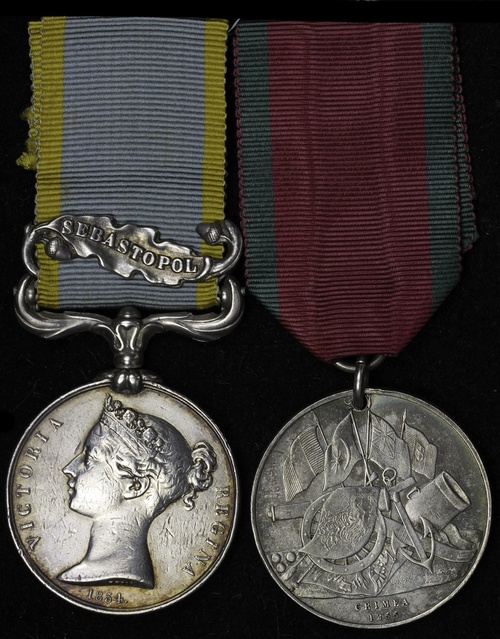
Auction: 25111 - Orders, Decorations and Medals - e-Auction
Lot: 399
Pair: Private G. Cullen, 41st Regiment of Foot
Crimea 1854-56, 1 clasp, Sebastopol (P** G. Cullen. 41st Foot.), unofficially engraved naming; Turkish Crimea 1855, British issue, unnamed as issued, pierced with dual ring suspension, parts of naming on Crimea Medal partially obscured by contact wear, heavy contact marks, otherwise very fine (2)
George Cullen was born at St. Luke's Parish in Chelsea, London and worked as a labourer prior to his enlistment with the 41st (Welch) Regiment of Foot on 7 March 1844 at London's Queens Square when he was nineteen years old. He served under regimental number 1930 and was advanced Corporal a few years later in December 1847. However, Cullen only retained this rank for a few years before being reduced to Private for being drunk on duty, for which he was subject to a Court Martial at Cork. He was tried and sentenced to serve 56 days imprisonment, from which he was released on 21 May 1849.
Cullen was tried again at Cork in another Court Martial on 13 June 1850 for being absent without leave, this time being sentenced to 26 days imprisonment. His discharge papers also note that throughout his length of service his name appeared 14 times in the Regimental Defaulters book.
The 41st Foot were posted for service in the Crimean War, disembarking at Kalamita Bay in summer 1854, and they saw action at the Battles of the Alma and Inkerman as well as the Siege of Sebastopol. Cullen's name appears on the roll with entitlement to clasps for Alma and Inkerman, as well as for Sebastopol. There is also a note on the Sebastopol medal roll that he was sent to England from Balaclava on 10 November 1855. The 41st Foot distinguished themselves in the war, during which they earned two Victoria Crosses, captured the Russian drums at Inkerman, and famously brought back to England a goat mascot.
At some stage after returning home from the Crimea, Cullen was posted once more overseas and served on the Ionian Islands for two years. His behaviour later during his length of service was much improved from his earlier days, and he received four good conduct badges from 1857 through 1863.
After a 21-year career with the Colours, Cullen was discharged with pension at Camp Colchester on 21 July 1865 at his own request, intending to return home to Chelsea and live at 8 Gregory St. He later died on 3 December 1875, aged just 51. Cullen is confirmed on the roll with further entitlement to clasps for Alma and Inkerman; sold together with copied research including medal rolls.
Subject to 20% VAT on Buyer’s Premium. For more information please view Terms and Conditions for Buyers.
Sold for
£130
Starting price
£130




